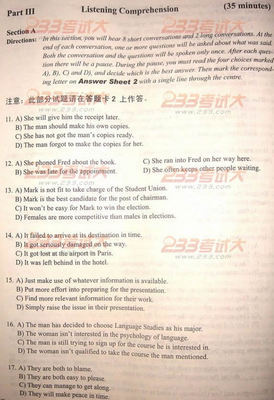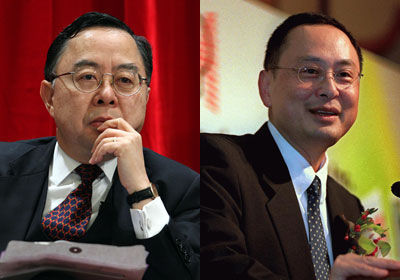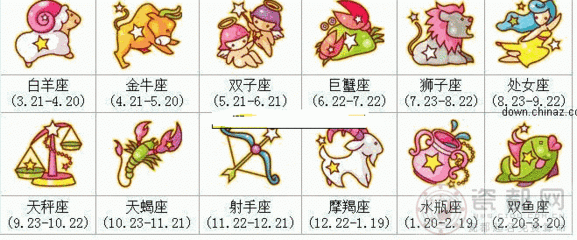
11.
W: I forgot to tell you that Fred calledlast night to borrow your sleeping bag.
M: Oh, I saw him at the gym this morning,but he didn’t say anything. So he must have asked somebodyelse.
Q: What does the man imply?
A:Fred may have borrowed a sleeping bagfrom someone else.
12.
W: These summer days are getting to bemore than I can take. It was even too hot to go to the poolyesterday.
M: Hang in there. According to the weatherreport we should have some relief by the end of theweek.
Q: What does the man mean?
A:It will cool down over theweekend.
13.
W: Well, tonight we have Professor Brownin our studio to talk about the famous oil painting of QueenVictoria. Good evening, professor.
M: Good evening, madam, my pleasure to behere tonight.
Q: What is the woman doing?
A:Hosting a TV program
14.
M: The plants next to the window alwayslook brown. You wouldn’t know by looking at them that I water themevery week.
W: Maybe they don’t like direct sunlight.I had the same problem with some of my plants. And a little shadehelps them immensely.
Q: What does the woman imply?
A:The plants should be put in a shadyspot
15.
M: I’m really exhausted, Mary. But I don’twant to miss the Hollywood movie that comes on at 11.
W: If I were you, I’d skip it. We bothhave to get up early tomorrow. And anyway I’ve heard it’s not asexciting as advertised.
Q: What does the woman suggest the mando?
A:Go to bed early
16.
M: Those modern sculptures over there arereally weird. Don’t you think so?
W:Well, I couldn’t stand them either atfirst. But now I’ve come to like modern art, particularly thosesculptures carved by Italian artists.
Q: What does the woman mean?
A:She has learned to appreciate modernsculptures
17.
M: I’m really glad our club decided toraise money for the children’s hospital. And most of the people wephoned seemed happy to contribute.
W: Yeah! I agree. Now that we’ve gonethrough all the numbers on our list, I guess we can call it aday.(因目的达到而告一段落)
Q: What do we learn about thespeakers?
A:They seem satisfied with what they havedone
18.
M: Have you heard of Professor Smith? I’mthinking of taking an advanced engineering course with him. What doyou think?
W: Yeah! You really should. He’s publisheddozens of books so far, once been recommended as a textbook forpostgraduates.
Q: What does the woman imply?
A:The man shouldn't hesitate to take thecourse
Long conversation one
W: You’re the editor of Public Eye. Whatkind of topics does your program cover?
M: Well, there are essentially domesticstories. We don’t cover international stories. We don’t cover partypolitics or economics. We do issues of general social concern toour British audience. They can be anything from the future of thehealth service to the way the environment is goingdownhill.
W: How do you choose the topic? Do youchoose one because it’s what the public wants to know about orbecause it’s what you feel the public ought to knowabout?
M: I think it’s a mixture of both.Sometimes you have a strong feeling that something is important andyou want to see it examined and you want to contribute to a publicdebate. Sometimes people come to you with things they are worriedabout and they can be quite small things. They can be a story aboutcorruption in local government, something they cannot quiteunderstand, why it doesn’t seem to be working out properly, likethey are not having their litter collected properly or the dustbinsemptied.
W: How do you know that you’ve got areally successful program? One that is just right for thetime?
M: I think you get a sense about it afterworking in it in a number of years. You know which stories aregoing to get the attention. They are going to be published just thepoint when the public are concerned about that.
19. What kind of topics does Public Eyecover?
A:Domestic issuesof general social concern.
20. How does Public Eye choose itstopics?
A:Based on publicexpectations and editor's judgement.
21. What factor plays an important role in running a successfulprogram?
A:Practical experience.
Long Conversation Two
W:Hi,Professor Smith.I hear you've writtena book titled Versions.
M:Yes,it explains how science willrevolutionize the 21st century.
W:could I ask you some questionsconcerningthe book?
M:Sure.
W:Are you optimistic about thefuture?
M:Generally,yeah.If we go back to the yearof 1900,most Americans didn't live beyond the age of 50.Since thenwe have improvements in health care and technology,there is whythis won't continue far in the 21st century.
W:Are we ready for the changes that willcome?
M:Changes are already happening.The futureis here and now.We have DNA,micro~~~,Internet.Some people 'sreaction is to say too oldwe don't understandhigh technology.My reaction is to say we must educate peopletouse high technology now.
W:Is world population going to be a bigproblem?
M:Yes and no.Ithink that world populationwill stop increasing as we get richer.If you are part of middleclass you don'twant or need 12children.
W:Will there be a worldgovernment?
M:Very probably.We'll have to manage theworld and resources on a global level because countries alone aretoo small.
W:Will we have controlledeverything?
M:I think we'll learn to control theweather,volcanoes,earthquakes.Illness won't esist.We'll grownew~~~~~~hearts and lungs likespare parts for a car.People will live to about 130 or 150.For 200years,we have tried to understand environment.Now we'll begin tocontrolit.
22.Q:What does Professor Smith say about most people in the1900?
A:There average life span was less than 50 years.
23.Q:When will the world's population stopgrowing according to Professor Smith?
A:when all people become wealthier.
24.Q:What does professor Smith think human beings will be able todo?
A:Control the environment.
Section B
Passage 1
Getting behind the wheel of a car can bean exciting new step in a teen’s life. But along with thatexcitement comes a new responsibility---understanding the need forcommon sense and maturity to avoid accidents. In an effort tospread awareness to teens across the nation, the AllstateFoundation sponsored a Keep-The-Drive Summit at Sunset Station onJanuary 23rd. Students from Kennedy and Alamo Heights High schoolsparticipated in the summit which was held here for the first time.The goal of the year-long effort is to educate teens on the rulesof safe driving and the severe consequences that can result ifthose rules are not followed, and then have them communicate thatinformation to their peers. The students watched videos that toldthem about the numbers of teenage driving injuries and deaths. Theylisten to the videos as students from other cities share theirstories of how their reckless driving affected not only their livesbut also those of their passengers. “We are trying to createawareness in high schools across the countries,” said Westerman, anAllstate representative, “we focus on changing how teens thinkbehind the wheel.” According to the presentation, more teens die inautomobile crashes in the United States each year than from drugs,violence, smoking and suicide. An average of 16 teens die every dayin motor vehicle crashes and nearly forty percent of those arecaused by speeding. Texas is the state with the most teen drivingdeaths according to the presentation. Students agreed that thestatistics were amazing and made them think twice about how theydrive.
Questions 26 to 28 are based on thequestion you have just heard.
Q26. For what purpose did the AllstateFoundation sponsor the Keep-The-Drive Summit?
B To alertteenagers to the dangers of reckless driving.
Q27. What causes the greatest number of deaths among American teensaccording to the presentation?
A Roadaccidents.
Q28. What can we conclude about theKeep-The-Drive Summit?
C It hasaccomplished its objective.
Passage 2
Dr. Allen Hersh designs smells forbusinesses. He says that it doesn’t take a whole lot of smell toaffect you. Store owners can lure you to the candy aisle, even ifyou don’t realize your are smelling candy. This idea scares a lotof people. Groups that protect the rights of shoppers are upset.They say the stores are using a kind of brainwashing which theycall “smell-washing”. “It’s pretty dishonest,” says MarkSilbergeld. He runs an organization that checks out products forconsumers. The scientists hired to design the scents disagree.“There’s soft background music. There’s special lighting. There’reall sorts of bells being used,” says Dr. Hersh, “why not smells?”“One reason why not,” says Silbergeld, “is that some people areallergic to certain scents pumped into products or stores.” Butthere is a whole other side to this debate, “do the smells reallywork?” So far, there is little proof one way or the other. But Dr.Hersh has run some interesting experiments. In one of Hersh’sexperiments, 31 volunteers were led into a shoe store that smellsslightly like flowers. Later, another group shopped in the samestore, but with no flower odor. Dr. Hersh found that 84% of theshoppers were more likely to buy the shoes in the flower-scentedroom, but Hersh found out something even stranger. “Whether thevolunteers like the flower scent or not didn’t matter,” Hersh says,“Some reported that they hated the smell, but they still were morelikely to buy the shoes in the scented room.”
Questions 29 to 31 are based on thepassage you’ve just heard.
Q29. Why are some people against the useof smells to attract customers?
B Customers maybe misled by the smells.
Q30. What is Dr. Hersh’s attitude to theuse of smells for business?
CSupportive
Q31. What did Hersh’s experimentshow?
A The flowerscent stimulated people's desire to buy.
Passage 3
This is Ray McCarthy with the news.Reports are coming in of a major train crash in Japan. A passengertrain carrying hundreds of workers home from the center of Tokyo isreported to have hit an oncoming goods train. Both were travelingat high speed. Figures are not yet available but it is believedthat the death toll could be as high as 300, with hundreds moreinjured. Emergency and rescue services rushed to the scene. But ourreporter says it will take days to clear the track and to establishthe numbers of the dead and injured. There was a similar accidenton the same stretch of track four years ago.
There was another bomb scare in a largeLondon store last night during late night shopping. Following atelephone call to the police from an anonymous caller, hundreds ofshoppers were shepherded out of the store while roads in the areawere sealed off. Police dogs spent hours searching the store for abag which the caller claimed contained 50 pounds of explosives.Nothing was found and the store was given the all-clear by openingtime this morning. A police spokesman said that this was the thirdbomb scare within a week and that we should all be on ourguard.
And finally, the motoring organizationshave issued a warning to drivers following the recent falls of snowin many parts of the country. Although the falls may be slight,they say extra care is needed.
Questions 32 to 35 are based on thepassage you have just heard.
Q32: What accident happened recently inJapan?
C a passenger train collided with a goodstrain
Q33: What do the reports say about therecent accident in Japan?
D the cause of the tragic accident remainsunknown
Q34: Why did people have to leave theLondon store last night?
A there was a bomb scare
Q35: What did motoring organizationsadvise drivers to do?
D drive with special care
 爱华网
爱华网


